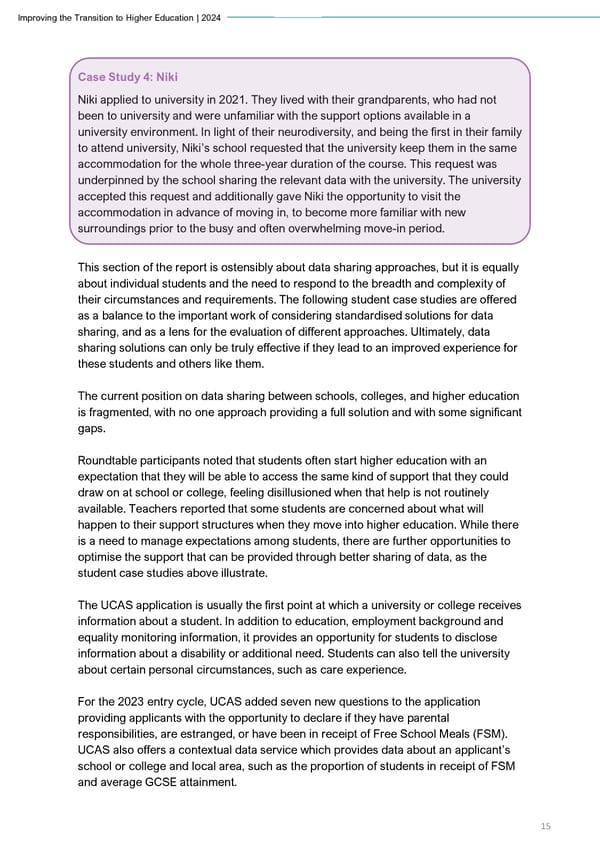Improving the Transition to Higher Education | 2024 Internal Case Study 4: Niki Niki applied to university in 2021. They lived with their grandparents, who had not been to university and were unfamiliar with the support options available in a university environment. In light of their neurodiversity, and being the first in their family to attend university, Niki9s school requested that the university keep them in the same accommodation for the whole three-year duration of the course. This request was underpinned by the school sharing the relevant data with the university. The university accepted this request and additionally gave Niki the opportunity to visit the accommodation in advance of moving in, to become more familiar with new surroundings prior to the busy and often overwhelming move-in period. This section of the report is ostensibly about data sharing approaches, but it is equally about individual students and the need to respond to the breadth and complexity of their circumstances and requirements. The following student case studies are offered as a balance to the important work of considering standardised solutions for data sharing, and as a lens for the evaluation of different approaches. Ultimately, data sharing solutions can only be truly effective if they lead to an improved experience for these students and others like them. The current position on data sharing between schools, colleges, and higher education is fragmented, with no one approach providing a full solution and with some significant gaps. Roundtable participants noted that students often start higher education with an expectation that they will be able to access the same kind of support that they could draw on at school or college, feeling disillusioned when that help is not routinely available. Teachers reported that some students are concerned about what will happen to their support structures when they move into higher education. While there is a need to manage expectations among students, there are further opportunities to optimise the support that can be provided through better sharing of data, as the student case studies above illustrate. The UCAS application is usually the first point at which a university or college receives information about a student. In addition to education, employment background and equality monitoring information, it provides an opportunity for students to disclose information about a disability or additional need. Students can also tell the university about certain personal circumstances, such as care experience. For the 2023 entry cycle, UCAS added seven new questions to the application providing applicants with the opportunity to declare if they have parental responsibilities, are estranged, or have been in receipt of Free School Meals (FSM). UCAS also offers a contextual data service which provides data about an applicant9s school or college and local area, such as the proportion of students in receipt of FSM and average GCSE attainment. 15
 Improving the transition to Higher Education Page 14 Page 16
Improving the transition to Higher Education Page 14 Page 16